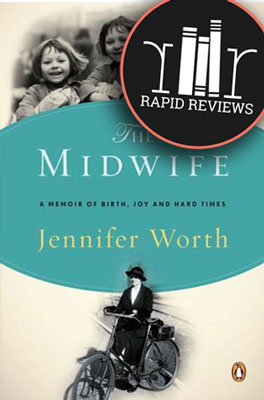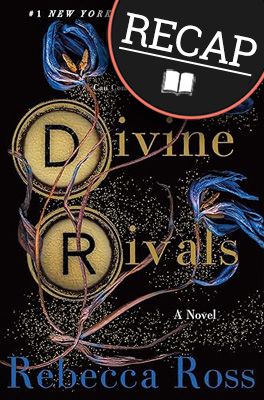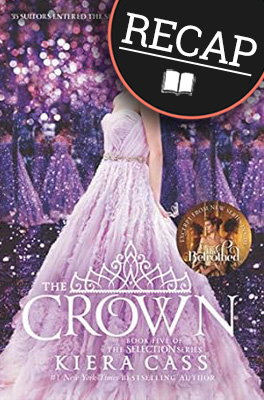No spoilers in this review of The Midwife Trilogy series (aka the Call the Midwife series) by Jennifer Worth.
Special thanks to Sarina Byron, a new BSR contributor who wrote this great review! Sarina is a British Author and Contributing Writer living in California. Sarina enjoys bringing forth a different perspective and encouraging a different way of thinking through her writing. Visit her blog to read her reviews, and check the end of the review for a link to her Instagram.
On a sultry California afternoon, I resisted slumber by looking through Netflix for something new to hum in the background whilst I worked. Thus, I chanced upon the Call the Midwife series, with which I developed a deep attachment immediately. My adoration was more than just the heart-warming nature of the stories: The series is set in England, and I’m British. My family lives in Greenwich not too far from the Docklands. And I lived in West India Quay in a gorgeously luxurious apartment rising tall above the Docklands with spectacular city views and the river passing quietly by.
I knew of Poplar as a station on the adorable Dockland Light Railway, which I took into work at Bank (the station for Bank of England) and knew that if I boarded the wrong train at Poplar, I could end up in parts of the Docklands in which I did not care to be. One of course knew of the reputation of the rougher parts of the docklands and stayed clear, one also knew of the rich history of those parts – after all, it was all in the name, wasn’t it: East India docks for East India company?
The series and the books, however, transported me to a different time where I could see the landscape changing before my own eyes. While I listened to the sound of ship vessels, I could see the tall buildings fall away, the docks open up, large looming ships come in, the river fog roll in, barges pull in half drowning under the weight of their own cargo, and Billingsgate market make sense to an unsuspecting creature like me. This part of London, which has always been a world in itself, took me down a path where so much came together and so much fell away.
The books paint a vivid picture of life in the East End, a kind of life most of us cannot even imagine: children playing in bombsites, crowded tenements with communal lavatories, large families with 13-15 children, laundry done by hand, brothels in abandoned buildings, loud costermongers deafening as one walks past, pubs full of casual labour in the evenings, sailors being nursed by nuns, nurses getting intimately involved, and hospitals being places of dread, not healing.
“Life turns on little things.” – Jennifer Worth
Jennifer Worth’s books Call The Midwife, Shadows of the Workhouse, Farewell to the East End, Letters to the Midwife, and In the Midst of Life are a walk through countless historical and social transformation lanes. We get to meet many a significant people from history, such as Florence Nightingale, and chuckle silently when the impertinent Sister Monica Joan wrote to her about being imprisoned in her home. In an unimaginable twist, Florence Nightingale avails of the ear of Her Majesty Queen Victoria to help free Sister Monica Joan.
We also get to meet those the majority of us have not heard enough of but who worked tirelessly to ensure the changing tides of time did not drown the disadvantaged. Father Joe Williamson, Daphne Johnson, the nuns and nurses at The Nursing Order of St. John the Divine (Nursing Order of St. Raymund Nonnatus) over its 99 years of existence in Poplar, Dr. Elisabeth Kubler-Ross, Dr. Cicely Saunders, and Josephine Butler all made major contributions in shaping society as we know today. I was very pleased to meet them through Jennifer’s books, and I’m sure you will be, too.
“Pain is something we cannot measure.” – Jennifer Worth
It is the mark of a great author to convey, discuss, and opine exclusive of partiality highly complex topics such as the ones Jennifer deals with in the books. She masterfully simplifies their history and intentions so every reader, no matter their background, is able to understand them and form their own opinion. She forms vivid imagery in the minds of the readers, and one walks with her, feeling her dilemmas every step of the way.
I felt most poignantly the moments when: Frank and Peggy were separated without warning, when she held the banisters and cried all day until she fell asleep from exhaustion and the moment; when a destitute and hopeless Mrs. Jenkins buried her youngest in the river in the absence of funeral funds; when Mr. Collette, an ex-guardsman who went to war multiple times for the country was lonely and isolated in his dirty accommodation; and when the Irish girl Mary was saved by Father Joe Williamson from a life of prostitution but unable to be saved from the demons of her harsh existence. Despite it all, they all were extremely grateful for whatever little the Nursing Sisters of St. John the Divine were doing for them. I would call them Dickensian tragedies, except they’re all real.
“It never does to plan ahead in wartime.” – Guardsman Collette
I descend from three generations of British and Indian Army officers and Indian freedom fighters in both my bloodlines, and nothing rings firmer than this statement. Through the two Great Wars, people learnt never to plan ahead and constantly reduce their needs according to circumstances, but what no one planned for or anticipated was the insuperable attitude of the British. The books speak of a lady being pulled out from under the rubble after a bombing, and her first words were, “Hitler got my husband, he got my children, he got my home, but he will not have me.” She took the only money she had on her and toasted life at the Master’s Arms pub.
If one has had the privilege of having grown up in this indomitable country, one knows the unconquerable attitude of which I speak. This runs as a theme in our lives in the UK, whether it’s the elderly insisting on remaining cheerfully independent right up to when the Angel of Death comes knocking or, in the books, how Guardsman Collette one by one gave his entire family, including his wife, up to the war; Miss Masterton’s determination to further her family’s publican legacy despite losing her entire family and child to tuberculosis; Cynthia’s lifelong struggle with depression; Novice Ruth’s devastating fight to keep faith; and the efforts of the Nursing Sisters of St. John the Divine and many others like them to keep medical care going amidst heavy bombing, most of which was concentrated in the Docklands. We live with the pride of your steadfast spirit and willingness to die instead of be dominated. You have given us a legacy of which to be proud.
“It is astonishing how people will not see what they want to see.” – Jennifer Worth
Jennifer deals with many a difficult topic in the books with immense honesty and practicality. Most of us can see the writing on the wall, but few of us are willing to face the wall. Jennifer takes us gently by the shoulders and shows us what we need to see. One can tell where she feels keenly about a topic as there will be multiple essays about that. In the Midst of Life, the standalone book that followed the series, ought to be included in medical studies not just for nurses but for doctors of all specialties and seniorities, too. Reading the essays on death, stroke, open heart resuscitation, and cardio-pulmonary resuscitation (CPR) ought to be studied (and not just read) so medicine is able to consider quality of life in addition to saving a life. Alive is not living, existing is not thriving, and resuscitating someone back to a half-vegetative state is tantamount to committing a crime against humanity.
“Social history is preserved in the accounts of those who lived at the time.” – Jennifer Worth
It is often the way of history to come back to haunt us. Those of us intimately acquainted with England know of the workhouses, but the fact that life in there was so bleak and those who survived lived with a broken spirit for the rest of their lives is hardly ever considered. The Poor Law Amendment Act 1834 started the workhouses, and a 1930 Parliament Act closed them, but these 96 years caused a bittersweet ripple in society. The poor and destitute had somewhere to go, children were all educated, vocational training ensued, and an opportunity for a re-start was provided.
However, the flip side saw families split often to never meet again. Spirits were broken from the daunting living conditions inside the workhouse, and human dignity was beat into the ground in favour of absolute obedience. One part of me wondered if Jennifer could have spared us the horror, and another was grateful she didn’t. We need to know how horribly wrong perfectly noble intentions can go. None of the Parliamentary Acts or amendments intended to create houses of horrors, and yet it all transpired.
“Don’t you think she went to heaven by taxi?” – Sister Julienne
Sister Monica Joan is exceedingly fascinating in the books, even more so than on the television show. She unabashedly inhabits a space of contrasts, giving her life to a cause and force greater than herself and yet thinking nothing of hundreds spent in her taxi cab indulgence. She spent her life uncomplainingly in the midst of abject poverty and large amounts of illiteracy and yet maintained her superior intellectual abilities. She never looked down on those she served and yet never felt the need to change to fit in. What a singularly fantastic lady!
Her matter-of-factness is the mettle of those of her times. She refused to be a relic and source of entertainment and social history, yet she shared when a story hit a nerve in her mind. She related in a most straightforward manner the plight of women who had no option but to commit suicide in the Cuts, often taking their children along; how families who couldn’t feed one more baby and suffocated them; and the surgical rape of scores of working-class women, owing to the Contagious Diseases Act of 1864. So full and complete was her life that a befitting goodbye was to imagine her riding to heaven in a taxi surrounded by a cortege of the most magnificent clouds.
“Wallowing in self-reproach gets us nowhere.” – Jennifer Worth
We are all flawed and perfect in so our own magnificent way. All five books bear witness to those who came before us and kept us company in being that. Ted, whose wife Winnie very obviously gave birth to someone else’s child, refrained from asking questions and went with love. We will never know if he looked within and questioned where he might have fallen short. The Great White Plague ravaged Europe in volcanic proportions during the 1800s and the 1900s, and yet when Benjamin Marten suggested the concepts of germs and contagion in 1722, he was ridiculed. Apart from missing the first opportunity towards ending tuberculosis, further delays ensued even after Robert Koch isolated tuberculosis bacillus in 1882. A vaccination trial ended in several deaths as live bacteria was mistakenly injected into many children in the 1950s, effectively halting the development of the vaccine for another decade. If those involved in the study of eradicating tuberculosis had lost heart and given up at every setback, we would be contending with tuberculosis in addition to Covid-19.
“Everything looks different from varying angles.”– Sister Monica Joan
Some social norms in the books may be considered great tragedies of the time. But really people do the best they can under the circumstances, and that’s all that is to these, too. The fact that children of poor families had to begin to work at as young as eight years old may seem like extreme misfortune today, but in those times, where bills were many and the plight of the poor extreme, this one act kept families together and kept their head above water. Similarly, today we might balk at the idea of going to work in a match factory, which was certain to cause death by phossy jaw, but when faced with destitution, the workhouse didn’t seem like such a bad choice after all. Illegitimate and unwanted babies being given up without a moment’s thought was not an option; it was the norm if people wanted to continue to live in the community. Stepping outside society was not smart or survivable, especially for the vulnerable.
Indeed, this is a lesson easily transposed to life today. Everything is perceived differently all over the world, and there is no one view on any aspect of existence. Perhaps that is the beauty of life: that every man will not be able to understand his neighbour’s or even partner’s choices but will continue to live in harmony or conflict. No matter how we live with each other, we still live together, thrive, love, celebrate, and experience every dichotomous condition together. On a parting note, I have the real names of the characters that loomed large in the television series and those that inspired characters not explicitly featured in the books but feature in the series. I have not revealed those here as this is not a tell-all comparative study of the books and series, but do leave me your guesses in the comments or write in!
Let us know what you think about this review of The Midwife Trilogy and Sarina’s great review in the comments! No spoilers on this page, please!
Ready to read The Midwife Trilogy? Click to buy and help us pay for hosting.

What now?
Don’t forget to check out Sarina’s blog, and you can follow her on Instagram!
Follow Book Series Recaps on Instagram, Pinterest, and Twitter.
Friend us on Goodreads: Sara and Stacy.
Oh and share this review of The Midwife Trilogy with your friends who might like this book!





















